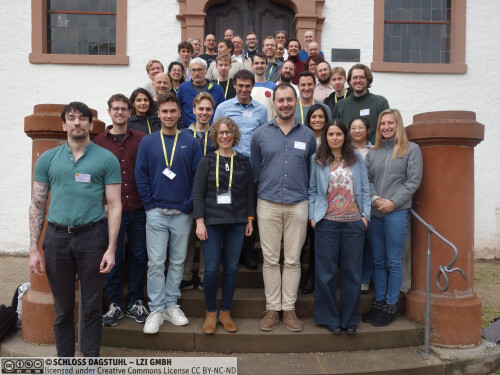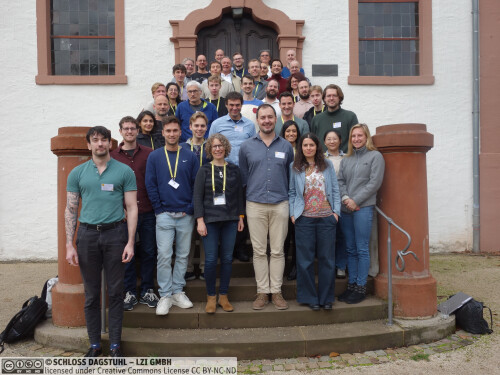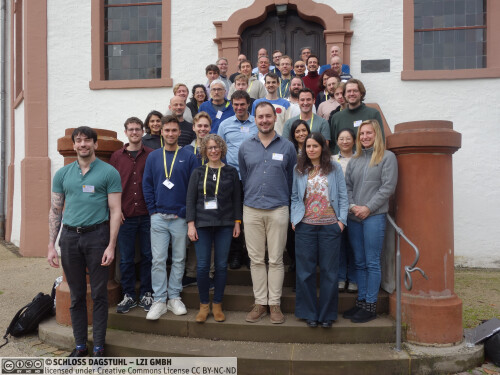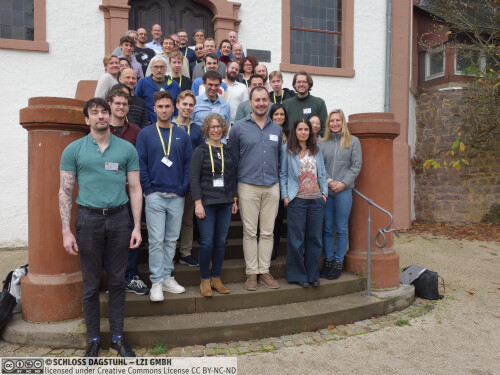Dagstuhl-Seminar 24451
Machine Learning for Protein-Protein and Protein-Ligand Interactions
( 03. Nov – 08. Nov, 2024 )
Permalink
Organisatoren
- Anne-Florence Bitbol (EPFL - Lausanne, CH)
- Jennifer Listgarten (University of California - Berkeley, US)
- Tomas Pluskal (IOCB - Prague, CZ)
Kontakt
- Andreas Dolzmann (für wissenschaftliche Fragen)
- Christina Schwarz (für administrative Fragen)
Gemeinsame Dokumente
- Dagstuhl Materials Page (Use personal credentials as created in DOOR to log in)
Programm
Over the past few decades, machine learning (ML) has helped advance progress in a wide range of problems in computational biology and biochemistry, particularly towards understanding the structure and function of proteins. Similarly, in cheminformatics, ML is increasingly influencing pharmaceutical decision making and enabling novel drug design strategies. However, an area of great importance that requires further advances, likely involving significant innovations, is the understanding, prediction, and design of protein-protein and protein-ligand interactions. This Dagstuhl Seminar aims to connect the protein-ML and cheminformatics-ML communities and foster their communication with key experts in biology and chemistry. This seminar will allow us to discuss both theoretical and application-oriented ML topics in the context of protein-protein and protein-ligand interactions. The initial topics for discussion are listed below:
Stream I: Theory and foundations
- Injecting biological and chemical knowledge as inductive bias into modeling
- Representation learning for proteins and small molecules
- Generative modeling for design and prediction
Stream II: Real-world applications
- Tackling the data availability problem
- Fundamental training datasets
- Model performance monitoring
- Reliable performance benchmarking
- Efficient interaction between ML experts and biology experts
- Interpretability and effective reduction of predictions to practice
We consider flexibility to be an important aspect of the seminar organization, and we will not impose a rigid structure. The core of the workshop will be based on discussion and brainstorming sessions, and not on formal conference-style presentations. The program for each day will be determined by collective discussion and by voting on the most interesting topics, which will typically result in splitting the participants into several smaller subgroups based on their interests. Each evening, we will meet with all the participants for a debriefing session, report on the outcomes of individual discussions, and plan the program for the next day. After dinner, we will have less formal concurrent sessions in smaller groups focusing on specific areas that comprise more immediately tractable problems. These evening sessions may also include short overview presentations on specific topics by selected participants.
 Anne-Florence Bitbol, Jennifer Listgarten, Tomas Pluskal, and Christoph Steinbeck
Anne-Florence Bitbol, Jennifer Listgarten, Tomas Pluskal, and Christoph Steinbeck
Please log in to DOOR to see more details.
- Anne-Florence Bitbol (EPFL - Lausanne, CH) [dblp]
- Sebastian Böcker (Friedrich-Schiller-Universität Jena, DE) [dblp]
- Alexandre Bonvin (Utrecht University, NL) [dblp]
- Anton Bushuiev (Czech Technical University - Prague, CZ) [dblp]
- Roman Bushuiev (The Czech Academy of Sciences - Prague, CZ)
- Alessandra Carbone (Sorbonne University - Paris, FR) [dblp]
- Alberto Cazzaniga (AREA Science Park - Trieste, IT)
- Simona Cocco (ENS - Paris, FR) [dblp]
- Francesca Cuturello (AREA Science Park - Trieste, IT) [dblp]
- Christian Dallago (Nvidia - München, DE) [dblp]
- Arne Elofsson (Stockholm University - Solna, SE) [dblp]
- Sergei Grudinin (CNRS - St. Martin-d'Hères, FR) [dblp]
- Ilia Igashov (EPFL - Lausanne, CH) [dblp]
- Petr Kouba (Czech Technical University - Prague, CZ) [dblp]
- Jessica Lanini (Novartis AG - Basel, CH) [dblp]
- Andrew Leach (University of Manchester, GB)
- Jennifer Listgarten (University of California - Berkeley, US) [dblp]
- Cyril Malbranke (EPFL - Lausanne, CH) [dblp]
- Hiroshi Mamitsuka (Kyoto University, JP) [dblp]
- Céline Marquet (TU München - Garching, DE) [dblp]
- Simon Mathis (University of Cambridge, GB) [dblp]
- Stanislav Mazurenko (Masaryk University - Brno, CZ) [dblp]
- Remi Monasson (ENS - Paris, FR) [dblp]
- Hunter Nisonoff (University of California - Berkeley, US)
- Armita Nourmohammad (University of Washington - Seattle, US) [dblp]
- Tomas Pluskal (IOCB - Prague, CZ) [dblp]
- Burkhard Rost (TU München, DE) [dblp]
- Juho Rousu (Aalto University, FI) [dblp]
- Alexander Schug (Jülich Supercomputing Centre, DE) [dblp]
- Josef Sivic (Czech Technical University - Prague, CZ) [dblp]
- Martin Steinegger (Seoul National University, KR) [dblp]
- Aalt-Jan van Dijk (University of Amsterdam, NL) [dblp]
- Pablo Varas Pardo (Institute of Mathematical Sciences - Madrid, ES)
- Andrea Volkamer (Universität des Saarlandes - Saarbrücken, DE) [dblp]
- Martin Weigt (Sorbonne University - Paris, FR) [dblp]
- Julius Wenckstern (EPFL - Lausanne, CH)
- Bruce Wittmann (Microsoft - Redmond, US)
- Xiaotong Xu (Utrecht University, NL)
- Omri Yakir (Tel Aviv University, IL)
- Lenka Zdeborova (EPFL - Lausanne, CH) [dblp]
Klassifikation
- Machine Learning
- Other Computer Science
Schlagworte
- protein
- ligand
- molecular interactions
- biological machine learning
- generative models





 Creative Commons BY 4.0
Creative Commons BY 4.0
